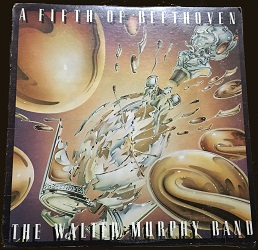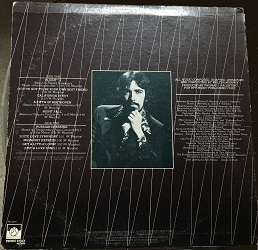The Atrocious Music Collection: #21 in a series
Artist: Walter Murphy (b. 1952)
Album Title: A Fifth of Beethoven
Category: Disco-ClassicalYear: 1976
Cover art style: Play-on-words
Audio: Acquisition: Believed to be a Christmas present, 1976. Blame Santa.
Click on picture for full-sized image
As has been done in a few other cases, I start with an apology to Walter Murphy, who is objectively a successful composer. For those who may see him as a 70’s relic, you should know that you’ve probably heard his work on Family Guy and other Seth MacFarlane productions. And he has an Oscar.
Ok, that’s out of the way. The A Fifth of Beethoven album is credited to the non-existent Walter Murphy Band (it was just Walter), and splits neatly into two halves. Songs like (You’ve Got to Be) Your Own Best Friend (redundant advice to the “Me Generation”), Just a Love Song (one of those self-referential songs), and California Strut (no comment) are original disco-light compositions. Competent, but ultimately forgettable.
Anyone who brought this album, though, put down their bicentennial quarters and newly minted Jefferson two-dollar bills for the classical numbers that underwent Murphy’s disco-fication process. Adaptations of classical works by rock bands had been part of the art rock movement for some time by 1976, going back to at least 1968 with The Nice’s use of Sibelius' Intermezzo from the Karelia Suite. (Or since 1956 if you want to include Chuck Berry's hit Roll Over Beethoven.) Murphy, it seems, pioneered the slightly different disco/classical connection, later exploited by the Hooked on Classics gang.
Murphy’s big hit was A Fifth of Beethoven, based on the first movement Beethoven’s Fifth Symphony. The play on words would remain a trademark of not only Murphy’s work, but the whole …”genre” seems too strong of a word. I’m particular found of David Shire’s 1977 Night on Disco Mountain, for example (probably because I’d love it if there really was a disco mountain). Anyway, if you haven’t heard Fifth, you may be living under a rock. It is still around, 40+ years later, and appears in movies such as Saturday Night Fever and Mystery Men, TV shows (Gotham, American Dad!) and Chicago Bulls games whenever there’s a turnover that favors the Bulls.
Murphy is relatively faithful to the original up to a point, at which time things go full-on disco with remnants of the “da-da-da-dum” motive popping up in the background.
The other tunes put through the disco machine show a Romantic and Russian bias. Tchaikovsky's First Piano Concerto becomes Russian Dressing, which is a pretty painful pun. Rimsky-Korsakov's Flight of the Bumblebee becomes Flight ’76, apparently a nod to the bicentennial. Kind of an odd patriotic gesture considering this was in the midst of the Cold War. And Chopin’s E-minor Prelude becomes Night Fall. The extension of Chopin’s one-page gem with extra repeats and lay-it-on-thick strings does Chopin a disservice.
Not that any of this is about servicing classical music. It’s about dancing and having a good time at the nightclub. (You can tell that's true just by looking at Walter's picture on the back of the album. He's looking at you, ladies.) And there is a element to these that is honestly fun. There is also a very high cheese factor, as well as a highly-variable cringe factor, depending on your views on the sacredness of the originals. To me Murphy's treatments are just terribly goofy, and I really don’t care if anyone may be spinning in their grave. That’s their problem.
Notice that Murphy sticks exclusively to the front of the classical bin. These are some of the most famous works in the repertoire. Later Murphy would play with Rhapsody in Blue, Bolero, Bach's Toccata and Fugue in D minor, and Mozart's G Minor Symphony, more Very Famous Music. There seems to be some part of this whole thing that relies on audience familiarity with the tunes. If you're turning classical music into disco, your choices are limited, I suppose, because in disco, as in all pop, you've got to have a hook.


